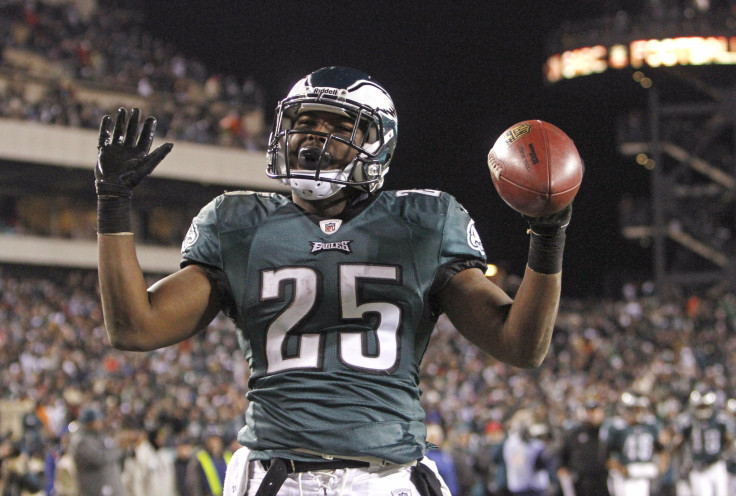Fantasy Football Terminology: Glossary Of Terms To Know For Beginners Ahead Of 2014 NFL Season

Knowledge of general football terminology does not necessarily translate to the fantasy football world. Even a seasoned fan of the NFL can struggle to figure out the difference between terms like “sleeper” and “keeper” before their fantasy football draft. Millions of people play fantasy football throughout the United States, and more people are starting to play every year. In fact, some have suggested that fans have begun to care more about their fantasy leagues than the actual NFL.
Even if you’re late to the game, it isn’t too late to catch up on the latest fantasy football terminology. Here’s a glossary of the fantasy football terms you need to know before your draft this season. Once you're up to date on the basics, click here for a list of funny fantasy football team names.
Add: The act of picking up a “free agent” and placing them on your fantasy football roster.
ADP (average draft position): A composite rendering of when an NFL player is typically selected in a fantasy football draft. The lower the number, the more valuable the player.
Auction Draft: A type of fantasy football league in which each team owner is given a set amount of “money” with which to bid on available players.
Autopick Draft: A type of fantasy football draft in which players are automatically assigned to each team, either randomly or based on the team owner’s pre-determined rankings.
Bench Players: Anyone who is not in your starting lineup is on your bench.
Bust: An NFL player who performs well below expectations.
Bye Week: The NFL season is 17 weeks long, but each NFL team only plays 16 games. From a fantasy perspective, owners generally attempt to stagger their players’ bye weeks so that their entire roster won’t have the same bye week.
Commissioner: The fantasy football owner in charge of running his or her league.
D/ST: “Defense/Special Teams” is a position in most fantasy football leagues. For example, a fantasy football owner who drafts the Philadelphia Eagles as their “D/ST” will gain points for stats such as interceptions and kickoff return touchdowns and lose points if the Eagles surrender too many points.
Drop: The act of cutting a player from your fantasy football roster.
Dynasty League: A type of fantasy football league in which a team owner’s entire roster carries over to the next fantasy football season.
Flex: Fantasy football’s “flex” position allows for team owners to plug in a player from almost any position without having to use up a precious starter slot. Most leagues allows for owners to use a WR (wide receiver), RB (running back), or TE (tight end) in the “flex” slot.
Handcuff: NFL running backs tend to get hurt more than most athletes, so fantasy football players will often draft a team’s starting running back as well as his immediate backup. Known as a “handcuff,” this backup is the player who is most likely to fill in for the injured starter.
IDP (Individual Defensive Player): Some fantasy football leagues opt to use IDPs, or “Individual Defensive Players,” instead of whole defenses. In these leagues, owners can draft DLs (defensive lineman), LBs (linebackers) and DBs (defensive backs) who are awarded points for stats such as tackles, sacks and pass deflections.
IR (Injured Reserve): Some fantasy football leagues allow owners to stash an injured player on “Injured Reserve,” a move which typically opens up a roster spot.
Keeper League: A type of fantasy league in which part or all of an owner’s roster carries over to the next season. Owners can be allowed to keep anywhere from one to an entire roster of players.
Live Draft: A type of fantasy football draft in which team owners select their players from a pool in real time.
Position numbers (RB1, RB2, etc): A way in which fantasy football players denote value. For example, a player who is considered a “QB1,” such as Denver Broncos quarterback Peyton Manning, has more value than a player who is considered a “QB2.”
PPR (points per reception): A fantasy football scoring system in which players are awarded points – usually either .5 or 1 – for every catch they make. Thus, players who catch a lot of passes, such as receivers, are more valuable than they would be in a standard league, which only awards points for yards and touchdowns.
Proj. (Projected): The amount of fantasy points that a player is expected to produce in a given week or season.
Serpentine Draft: A type of fantasy football draft order in which the draft “snakes” back around after the first round. In other words, the last team to pick in the first round would be the first team to pick in the second round.
Sleeper: An “under the radar” fantasy football player who has a good chance of exceeding his expected level of production. Rookie players are often considered “sleepers.”
Standard League: A fantasy football scoring system in which offensive players are awarded points for yards and touchdowns only.
Waiver Priority: Determines which fantasy football team has the best chance to pick up a player off the waiver wire if there is more than one bid for his services.
Waiver Wire: A term to describe the fantasy football league’s “free agent” players.
© Copyright IBTimes 2024. All rights reserved.






















